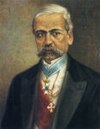The Greens of Andorra is a green political party in Andorra.

Federal elections were held in Germany on 21 February 1887. The National Liberal Party became the largest party in the Reichstag by winning 98 of the 397 seats, whilst the Centre Party, formerly the largest party, was reduced to 98 seats. Voter turnout was 77.5%.

Federal elections were held in Germany on 28 October 1884. The Centre Party remained the largest party in the Reichstag, with 99 of the 397 seats. Voter turnout was 60.5%.
The Democratic Party is a centre-right political party in Bulgaria led by Alexander Pramatarski. The party was a member of the European People's Party (EPP).

Folketing elections were held in Denmark on 28 October 1947, except in the Faroe Islands where they were held on 18 February 1948. The Social Democratic Party remained the largest in the Folketing, with 57 of the 150 seats. Voter turnout was 86% in Denmark proper and 60% in the Faroes.
Parliamentary elections were held in Greece on 6 October 1856. Supporters of Dimitrios Voulgaris won a majority of the 138 seats. However, Voulgaris remained Prime Minister only until 25 November the following year, when he was replaced by Athanasios Miaoulis.
Parliamentary elections were held in Greece between 24 and 27 November 1862. The elected Parliament was also responsible for drawing up a new constitution. Dimitrios Voulgaris became Prime Minister on 23 December as head of the Provisional Government.
Parliamentary elections were held in Greece on 21 March 1868. Supporters of Alexandros Koumoundouros and Dimitrios Voulgaris won a majority of the 184 seats. Voulgaris remained Prime Minister, having assumed office on 6 February.
Parliamentary elections were held in Greece in June 1874. The United Opposition won 96 of the 190 seats. Dimitrios Voulgaris remained Prime Minister.
Parliamentary elections were held in Hungary on 25 and 26 January 1920. However, they were only held in 164 districts. After the Treaty of Trianon was signed, the 44 districts previously occupied by Romania voted between 13 June and 5 July, whilst the 11 districts occupied by Serbia did not vote until 30 and 31 October 1921. The election was held with compulsory voting. In protest at this and other changes to the franchise that left 60% of the voting age population unable to vote, the Hungarian Social Democratic Party boycotted the elections, and called for its supporters to cast invalid votes, resulting in an unusually high number of blank or invalid votes – 12% in the January elections and over 20% in Budapest and other major cities.
Parliamentary elections were held in Hungary between 8 and 15 December 1926. The result was a victory for the Unity Party, which won 161 of the 245 seats in Parliament. István Bethlen remained Prime Minister.

General elections were held in Italy on 29 October 1882, with a second round of voting on 5 November. The "ministerial" left-wing bloc emerged as the largest in Parliament, winning 289 of the 508 seats.
General elections were held in Italy on 23 May 1886, with a second round of voting on 30 May. The "ministerial" left-wing bloc emerged as the largest in Parliament, winning 292 of the 508 seats. As in 1882, the elections were held using small multi-member constituencies of between two and five seats.

General elections were held in Portugal on 28 April 1918, following a coup by Sidónio Pais in December 1917. The elections were boycotted by the Democratic Party, the Evolutionist Party and the Republican Union, who had won over 90% of the seats in the 1915 elections.
General elections were held in Romania in June 1939. The Chamber of Deputies was elected on 1 June, and the Senate on the following day. They were the first elections since the introduction of the royal dictatorship of King Carol II under the 1938 constitution. Voters were presented with a single list from the National Renaissance Front, which had been the only legally permitted party in Romania since December.
Federal elections were held in Switzerland on 26 October 1919. The Free Democratic Party emerged as the largest party in the National Council, winning 60 of the 189 seats.
Federal elections were held in Switzerland on 29 October 1939. The Free Democratic Party emerged as the largest party in the National Council, winning 49 of the 187 seats. Due to the outbreak of World War II, there were no elections in nine of the 25 cantons; Appenzell Ausserrhoden, Lucerne, Neuchâtel, Schwyz, Solothurn, Ticino, Valais, Vaud and Zug. In what became known as "silent elections", a total of 55 candidates were elected unopposed.

The People's Party was a political party in Bulgaria between 1894 and 1920.

The United Labour Social Democratic Party was a political party in Bulgaria.
The Tenants' Union was a political party in Estonia.










